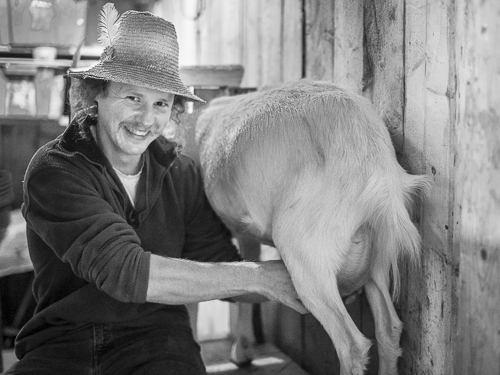We went to a farm called Trifolium Kajo where we were welcomed by Jonas from Belgium and his wife Katalin, a local woman. He grew up with hens and rabbits, but it was not a farm. Now, they have 14 goats in all, while all their neighbours have cows.
Both of them have been working abroad and they first came to this area in 2004 because Katalin liked going to dance festivals and they came back every summer. Some time they came to this farm, which was for sale, and they decided to buy it. It is located in a lovely area, being surrounded by hilly meadows and forests. Unfortunately, although the farm borders fertile meadows, they are owned by others, but his father-in-law is a farmer and he supplies the farm with mountain hay, which is full of tasty herbs. Jonas also feeds the goats sunflower seeds, from which vegetable oil has been extracted.
The couple built the house where they live in 2010, demolishing a house which had been set up on stones. They started with building a solid cellar on which they built a wooden traditional house.
Next, they started with 2 goats, having no experience, but Jonas has always liked goats. In the beginning, the pen was too low, then he made it higher. However, he needed an electrical fence to keep them inside.
6 goats are milked daily at 5 in the morning by Jonas, who learnt milking by trial and error. The rest are 5 young goats and 4 male goats. 3 of the males will be slaughtered at the farm and the meat will be for the family only. One big male goat and one goat have been imported from Belgium, while the rest have been bought from local farmers.He wants to have 30 goats, which will give about 100 litres of milk a day. He wants to milk them by means of a milking machine and he wants to have one or two employees. At present, he’s doing it by himself, only helped by his wife who also takes care of their young daughter.
Jonas showed us how the goats enter on their own volition to be milked. First, they enter a small room where a goat will rise up to a wooden device with an indent where it needs to place her throat in order to reach some feed. Then, he puts a wooden beam above her neck, locking the goat in place. Having milked a goat, he releases it and the next one will enter.
Jonas has worked as an electro-mechanical engineer worldwide and, using his technical background, he has installed solar panels, whose excess current is used to charge a big battery. He has installed a wood-fired oven, which heats up water for central heating. During our visit, I could also see a ditch for holding a tube, obviously forming another one of his technical plans.
The goats were inside wooden pens and they were very approachable, even too much much since it felt like they wanted to eat my clothes!
The locals sell cow’s milk for a very low price to dairies, but Jonas and his wife want to sell cheese instead in order to get a much higher price. On the outside, the dairy will look like a traditional local building when it’s finished, having kept the windows from another building as a start. Inside, a Romanian company has set up a modern dairy where concrete covered by a resistive layer shield both the floor and the lower parts of the walls. The walls are covered by plates which are covered by plastic, the windows are locked airtight and all joints are overlaid by silicone. Obviously, everything is done to keep the dairy as clean as possible.
The dairy contained a wide variety of modern dairy tools, ensuring that high quality cheeses can be made. However, the adjoining storeroom looked tight and it will probably have to be expanded if he gets more goats.
Unfortunately, the dairy is not approved by the health authorities due to lots of bureaucracy, but Jonas makes and sells cheese anyway. He has already learnt speaking Hungarian, but in order to navigate the bureaucracy and get the permit, he will also have to learn Romanian, not an easy task when he is surrounded by Hungarian-speakers.
He makes
- half hearts cheese, which has matured for 3 months
- white mould cheese (resembling camembert)
- picodon
- ricotta
White mold cheese was stored below a small metal container. The cheeses were lying on a metal grid, while below there was a small basin with lukewarm water, which would be beneficial for growing more mold by keeping the air around the cheeses humid.
While Jonas showed us around, his wife served cakes and coffee together with pálinka made by Jonas from plums.
Although both Katalin and Jonas always have to work, there is little stress and they have a healthy lifestyle.
Last but not least, we would probably not have gone to this farm if it hadn’t been for another Belgian man who is married to a Romanian woman and the couple lives in the village of Borszova, the same village where I stayed at the Néra guesthouse.
In fact, both the family of the Belgian man and the family of my hostess together with my guide went on this trip, a big difference from just arriving with a guide.

